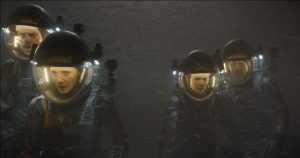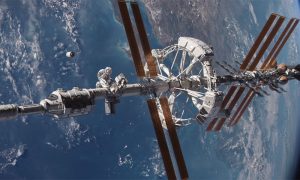
Cut & Print: The Martian (2015)
The most interesting aspect of Ridley Scott’s new science fiction film The Martian is that it is that the legendary director does not treat it as fiction at all. He directs with that calm professionalism that had been lacking in the bigger blockbusters this year and crafts the film in such a way it might seem like a man really was left behind on the inhospitable planet, and that he had be innovative in order to survive as he awaited rescue. The film presents this story as if it had actually happened. Some viewers who haven’t been keeping up with our space program might be convinced by what happens on screen here, and they might get back from theater and dive right into Google and YouTube in the hopes of finding out what really happened. I actually do that everytime I re-watch Apollo 13, which tells a very similar story with the added bonus that it did happen. Others – who I should hope are most people – might walk out of the theater with a more basic emotion: that they’ve just seen a hell of a movie. Yeah, they knew going in that there’s never been a manned expedition to Mars, but Scott and his ensemble have managed to make it all seem like there had been, even if for the two-plus hours that this film runs.

The fact that Scott has made this movie without any stylistic excesses and has endeavored to make everything seem as authentic as possible throughout also make it that much more notable when something doesn’t quite fit. They strive for realism, yet in only doing a marginal amount of research (or applying common sense) one would find out that manned spacecrafts or space stations such as the ISS have very little space on board, as every single inch much serve a function. Compound this with the idea of building such a large craft and ensuring that the air supply can be sustained and recycled, it seems very impractical that any craft of this type would (or could) be built large enough to house a gymnasium and a very large cafeteria, or that it would use such space for so little of absolute need.
Also, by the time we would have successfully gotten humans to Mars would imply that we would have conducted a huge battery of tests (such as creating greenhouses by actually instituting a “greenhouse effect” on purpose by pumping CFC’s into a contained space to trap as much heat as possible to allow for plant growth, or even using the method featured in the film in which the hero uses fecal material to fertilize the native soul on the planet.) Neither these experiments would be overlooked by the space agency, and as hard as the movie tries to create a scenario wherein one astronaut would plausibly be left behind and be left to fend for himself would have been one of hundreds of scenarios that would have been considered no matter how likely it would seem.
These objections really aren’t that important, because this is an entertaining film, tightly written, with some of the freshest and funniest montage sequences I’ve seen in a movie in quite some time. Everything about this film is quite solid: it’s easy to recommend and it’s easy to watch.

Yet all of that aside, it’s also a little dry. The story has only one trajectory, and, to a cynical film fan like myself, it feels more like watching a film play out just as it should than watching something that really is inspired and lively. Even with a few bumps in the road for the characters as they try to work the problem (by the way, seeing characters use their talents to “work a problem” is a breath of fresh air after spending all summer seeing superheroes blast robots with laser beams – and yes, that stuff can be fun, too) the only way the film could really exceed expectations is by pondering the craftsmanship that went into making it, not the material itself.
I remember reading a film review from the man who was the most influential film critic ever, Roger Ebert, discussing why he didn’t much like a film that I liked a whole lot: A Few Good Men. He noted a scene just before the final courtroom scene where in the hero not only revealed that he’d call in Jack Nicholson’s character to the stand in a final gambit, but he also told his colleagues exactly what how he was going to shake him on the stand to get him to say what he wanted him to say. Ebert argued that all the surprise had been gutted from that great scene and that “the movie is reduced then to a lesser pleasure: of watching good actors do good work.”
He made a good point, and I had the same feeling watching The Martian: everyone involved did good work indeed, whether in front of the camera or behind it, but despite a few small surprises (none of which were that surprising, really) couldn’t take me away from feeling that I was just watching everything play out to a fairly foregone conclusion. It’s entertaining as hell, but, now that we’ve reached October and finally have a film that serves as a welcome respite from the fantastical comic book fare we’ve been getting for months, this movie feels a bit dry, run of the mill, and lacking that inspiration that would make this a story really worth telling.
Most viewers are probably not so cynical, and they’ll have a great time. Don’t get me wrong, I had a great time, though I liked this movie much better back in the 90’s when it was called Apollo 13.
My Rating: 4/5. Tomatoes incoming! Time to duck!












